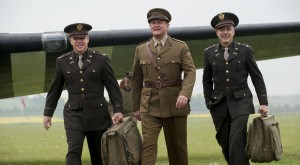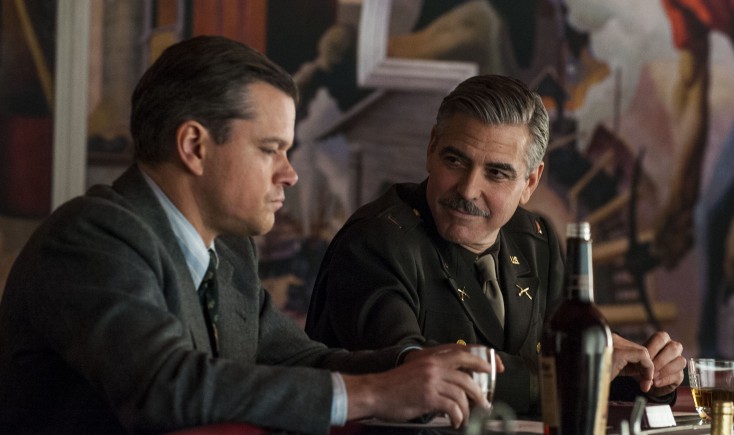
(l to r) Matt Damon, Hugh Bonneville and George Clooney in Columbia Pictures’ THE MONUMENTS MEN. ©Columbia Pictures. CR: Claudette Barius.
By ANGELA DAWSON
Front Row Features
HOLLYWOOD—As with his “Ocean’s” trilogy, “Leatherheads,” and “Good Night, and Good Luck,” George Clooney leads a band of misfits into what appears to be a hopeless, or at least a long shot situation, and manages to beat the odds in the self-directed “Monuments Men.”
This time around, the actor-filmmaker plays an art curator, who is called into active duty during World War II to lead a secret mission to recover priceless artworks stolen by the Nazis. As Lt. Frank Stokes, he and his ragtag group of architects, historians and other art experts are brought to the front lines to carry out their mission before Hitler can give the order to destroy the cultural treasures as the war winds to a close.
The 52-year-old Clooney recently spoke about this true but little-known chapter of World War II history, his attraction to the project and assembling his all-star cast that includes Academy Award winners Matt Damon, Cate Blanchett and Jean Dujardin (“The Artist”), Academy Award nominees Bob Balaban and Bill Murray and Golden Globe winner John Goodman.
Q: This film deals with a heavy subject matter but the story is told with a light touch. Was that always the angle you were looking for?
Clooney: Yes. We wanted to make an entertaining film and we liked the story but we weren’t all that familiar with the actual story, which is rare for a World War II film. Usually, you think you know all the stories. We wanted it to be accessible. I like all those John Sturges (“The Magnificent Seven,” “The Great Escape”) films. We thought of it as a mix between “Kelly’s Heroes” and (John Frankenheimer’s) “The Train.” We wanted to talk about a very serious subject that is ongoing, and we wanted to make it entertaining. That was the goal.
Q: How did you get Cate Blanchett onboard as the French art gallery owner, who helps the Allies in their art rescue operation?
Clooney: The pitch to her was that she wouldn’t have to work with Matt (Damon). (He pauses.) I lied.
Q: Can you tell us a bit about the casting process?
Clooney: Casting was fun. We couldn’t get Brad (Pitt) so we got Matt. (He chuckles.) It was really fun. Grant (Heslov, Clooney’s co-screenwriter and co-producer) and I sat down and were writing it. We hadn’t thought of Bob (Balaban, for the role of art historian Preston Savitz), but then we went to an “Argo” (post-Oscar) party and we saw him, and we had this part. We knew we wanted Bill (Murray) in it and we kept thinking, “Who are we going to put opposite of Bill? Who Bill can he give a really hard time to?” Then, at this party with Bob, we looked over and I said, “Oh, it’s perfect!” and Grant said, “It’s perfect!” So we called Bob the next day. The rest of the gang we wrote it with them in mind, so that helps a little bit when you’re writing.
Q: How was it working with these actors who had to portray the Nazis?
Clooney: I do feel bad for the actors. For about 75 years, these German actors had to play Nazis. You bring them in to read and you just say, “Yeah, I know I’m sorry but I do need you to be sort of really mean.” Then they would say maybe, “My character joined the Nazi’s because…” and I would say, “No. He’s a bad Nazi. You’re going to just have to be bad.”
Q: How did you like working with (French actor) Jean Dujardin?
Clooney: Jean also is really fun and he’s really funny. He really loves what he does. The minute he walks into the room, he’s just funny and everyone just gets it.
Q: Are any of the real Monuments Men still alive?
Clooney: There are a few of them still alive. They were the younger ones, obviously.
Q: You seem to direct a feature film every three years. What attracted you to directing in the first place? How different are you now as a director than you were when you started out with “Confessions of a Dangerous Mind?”
Clooney: Well, George Clooney has learned to speak about himself in the third person. (He smiles.) The timing for directing is that it usually takes that long to develop a piece and (go through) pre-production and post-production. I prefer directing as opposed to doing other things. Directing and writing seem to be infinitely more creative. As far as how I’ve changed, well, what you try to do is learn from people that you’ve worked with. I’ve worked with the Coen brothers and (Steven) Soderbergh and Alexander Payne. I’ve worked with really great directors over the years, and you just try to see what they are doing and then try to steal it. That’s the theory. You go, “Oh, I like that, I’m going to do it that way.” So the truth is that your development you hope is the same as everything: you succeed some and you fail some and you keep slugging away at it. I really enjoy it. It’s fun. I like it more then acting now. It’s tricky directing yourself, obviously. I say, “George, you were very good!” (He laughs.) Anyway, I do enjoy directing I don’t know whether it’s improving or not, but it’s certainly evolving in different directions.
Q: Has getting a film made in Hollywood changed for you over the years?
Clooney: I think Grant and I, as partners for a long time, have been interested in trying to find stories that are unique, and stories that aren’t necessarily slam dunks for the studio to make. That would require and would consist of us picking it up and carrying it in. This one, as the cast grew, it became a lot easier to swallow. But it’s hard to make films like this. It was hard to get “Argo” made. It took us a long time to get it made. It was hard to get “Good Night and Good Luck” made. I had to mortgage my house for it, so we are just trying to do films that people would obviously say, “Yes, let’s make it!” Sometimes, they’re successful and sometimes they’re not, but they’re the ones we want to make. Our inspiration, in general, is to try to get stories made. If we didn’t go after them, they probably wouldn’t get made because the (more commercial films) are going to get made anyway.
Q: On a separate topic, what do you think of Alfonso Cuaron’s Academy Award nomination for “Gravity?”
Clooney: I thought the film fell apart about half an hour into it (He laughs.). Alfonso is one of the great geniuses in the game. He really is a genius. He hasn’t made a bad film. He had a great love of what he does. I can’t tell you what an honor it was to work with him (on “Gravity”) and see what he was doing. I’m telling you, (Sandra Bullock and I) had no idea what was going on, because it was two years of post-production finishing it. It was crazy! They were doing stuff that they hadn’t even invented yet in terms of CGI.




